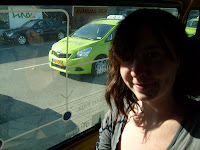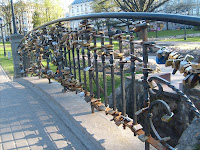Toen langzaam het besef binnendruppelde dat de aangekondigde bezuinigingen het einde zou betekenen van een aantal musea waar de collectie ongezien staat te verstoffen, kleine theatergezelschappen die nog nooit iemand gezien of van gehoord heeft en WIK-uitkeringen van mensen die vinden dat ze recht hebben op gratis geld alleen omdat zij zichzelf als 'kunstenaar' beschouwen, vond ik dat tot mijn eigen verbazing helemaal niet zo erg.
Zegt ze dat echt? Ja. Dat zegt ze echt. Rustig maar, het wordt beter. Het gaf te denken, want ik roep altijd dat ik (kunst &)cultuur heel erg belangrijk vind. Maar waarom dan toch? Hierom.
Ik vind dat je je geschiedenis moet kennen om je heden te begrijpen en je toekomst te kunnen voorzien. "We zagen het niet aankomen", is net zo'n onzin-excuus als "het gebeurde gewoon". Er is namelijk niks nieuws onder de zon. Cultuur in al haar uitingen (muziek, film, dans, schrijfsels, theater, beeldende kunst, etc) is een hele toegankelijke manier om geschiedenis begrijpelijk te maken. Het kan duidelijk maken dat er méér is. Meer mensbeelden, meer ideeën, meer religies, meer gebeurtenissen, meer goed en meer kwaad. Er is niet één verhaal. Het leven is geen dogma.
Vroeger, in het kader van geschiedenis, zei Julius Ceasar al: 'geef het volk brood en spelen'. Nu is het: 'annuleer de spelen en oh ja, pak het volk in ieder geval haar broodbeleg af'. De tijd zal leren welke gevolgen dit heeft. Ik vrees alleen dat als K&C het
 parapluutje én de cocktail is, en het volk op een dieet van kraanwater wordt gezet, dit tot algehele culturele anorexia zal lijden. Ondanks dat ik voorstellingen op Oerol heb gezien waarvan ik oprecht dacht: "wegbezuinigen, meteen", Hofstra en Thiry: shame on you! Hoe hebben jullie kunnen denken dat er mensen zijn die zulke troep zouden willen zien? Wansmaak is ook smaak, maar als dit theater is, dan liever niet.
parapluutje én de cocktail is, en het volk op een dieet van kraanwater wordt gezet, dit tot algehele culturele anorexia zal lijden. Ondanks dat ik voorstellingen op Oerol heb gezien waarvan ik oprecht dacht: "wegbezuinigen, meteen", Hofstra en Thiry: shame on you! Hoe hebben jullie kunnen denken dat er mensen zijn die zulke troep zouden willen zien? Wansmaak is ook smaak, maar als dit theater is, dan liever niet. Aan de andere kant kun je overal een cultuurbeleving hebben: er staat meer muziek op internet dan waar je in een mensenleven naar kan luisteren, kinderen krijgen nog steeds papier en verf om zichzelf mee te vermaken, basisschoolklassen houden (vast) nog steeds miniplaybackshows (nu mini X-factor) om de verjaardag van hun juf mee te vieren en wellicht is er wel budget voor een Opzoomer-actie om wijken niet alleen schoon maar ook aan de kunst te krijgen. Ik, en hele generaties voor mij, heb nooit CKV-lessen gehad op school, maar had zelf de behoefte om bij een jeugdtheaterschool te gaan. Op vakantie gaan (Nederlandse) toeristen ook naar de musea en worden er geschiedkundig-verantwoorde kastelen bezocht. Ik ben dus ook niet bang dat kunst&cultuur verdwijnt, maar wel dat er een groep kinderen opgroeit die slechts televisie en games als hun culturele kader kennen.
Afsluitend verwijs ik naar de speech van Ramsey Nasr bij de Mars der Beschaving. Hij zegt op een gegeven moment (op 1:22 om precies te zijn) over de politieke botte bijl-manier 'c'est le ton qui fait la musique'; het is de toon die de muziek maakt. Laat dit nou ook het motto van politie-korps Hollands Midden zijn! Eindelijk kan ik mijn liefde voor cultuur en criminologie aan elkaar linken. Ik heb het altijd al gezegd: cultuur heeft een dempende werking op criminaliteit. Er ligt een onderzoeksvoorstel klaar op een plank in mijn boekenkast met de werktitel 'Zolang ze dansen, stelen ze niet' over de hypothetische positieve invloed van het meedoen aan culturele projecten voor (at-risk) jongeren. Maar ja, wetenschappelijk criminologisch onderzoek, daar is natuurlijk ook geen geld voor.
















